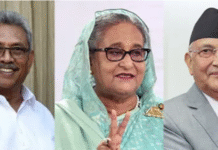
In this Sunday, Jan. 21, 2018, file photo, relocated Rohingya refugees arrive at the Balukhali refugee camp outside Cox’s Bazar, Bangladesh. (Manish Swarup/AP)
For the past two months, I have served on an international panel designed to help the Myanmar government arrive at just and reasonable policies for its conflict in Rakhine state, including its long-suffering Rohingya minority. This week I resigned. The reason: I have little confidence in the body’s ability to address the critical challenges facing the region and the country.
Aung San Suu Kyi, the country’s effective leader, is isolated and unwilling to listen to constructive criticism. Her government is focused on getting things done quickly instead of getting them done right. If Myanmar, also known as Burma, is to have any hope of preventing a further downward spiral to the crisis in Rakhine state and restoring its international reputation, immediate and dramatic changes are required. A continuation of the current approach is likely to lead to a dangerous cycle of violence that threatens both Myanmar’s hopes for peace and democracy and broader regional stability.
To be sure, Myanmar faces daunting challenges on Rakhine. Coordinated attacks by a new Muslim militant group triggered a brutal and sustained “security clearance operations” by the Myanmar military that, in just 15 months, forced nearly 800,000 people to flee to Bangladesh. Deep-seated mistrust festers between Buddhist and Muslim communities in Rakhine, as well as between each of these communities and the government. Systemic discrimination against minority groups, especially Muslims, remains rampant. Major drug-smuggling and human-trafficking networks plague the region. And chronic underinvestment in health, education and the economy exacerbate the problems.
Myanmar is rightly facing tremendous international pressure to implement changes, but this does not justify the government’s siege mentality and its resistance to constructive criticism from an international community that wants to see Myanmar succeed in its efforts to establish peace and development in Rakhine and to entrench democratic norms.
To begin to turn the situation around, the government of Myanmar should take three steps immediately. First, Aung San Suu Kyi must establish her moral leadership on the Rakhine issue. Although her popularity is lower than when her party swept elections two years ago, she is still widely respected in Myanmar, particularly among the majority ethnic Burmese. She should use her stature to unequivocally condemn hate speech and discrimination in her public communications to the people of Myanmar. It would also be helpful if she ensured that state media, which has referred to Muslims from Rakhine as “human fleas,” does not exacerbate the potential for conflict.
Second, Myanmar must establish effective accountability mechanisms for perpetrators of violence. The signal that impunity is tolerated is a threat to the rule of law that Aung San Suu Kyi has repeatedly stated she seeks to instill. I am encouraged by Myanmar’s seeming willingness to establish an independent and credible investigation into the discovery of mass graves in Rakhine, and I hope that this will be the first of several steps to further understand and account for the violence that has occurred there since October 2016.
Finally, Myanmar must develop a strategy to deal with Rakhine that appropriately prioritizes and sequences among the recommendations of the Rakhine Advisory Commission. The government’s focus on infrastructure and development, while important, is insufficient to address the structural changes necessary. To ensure that key challenges such as freedom of movement, citizenship and the closure of internally displaced persons camps are addressed effectively and in the spirit in which they were intended, the Myanmar government should work closely with international partners to develop clear and public plans that lay out the step-by-step process by which these issues will be addressed and bench marks met.
Left unaddressed, the situation could quickly become an even bigger headache for Myanmar, the region and the world. In the short term, the repatriation process that Myanmar is racing to implement is sure to be symbolic at best: Provided returns are safe, voluntary and dignified, few refugees will go back to a country in which they have been violated, which does not respect their basic rights and which offers no means of redress for wrongs. That leaves a large, destitute and aggrieved population just across the border in Bangladesh that is susceptible to radicalization. For the sake of its own interests and those of the region, Myanmar must immediately correct course and recognize that the international community wants to help it to do so.
The article appeared in the Washington Post on










